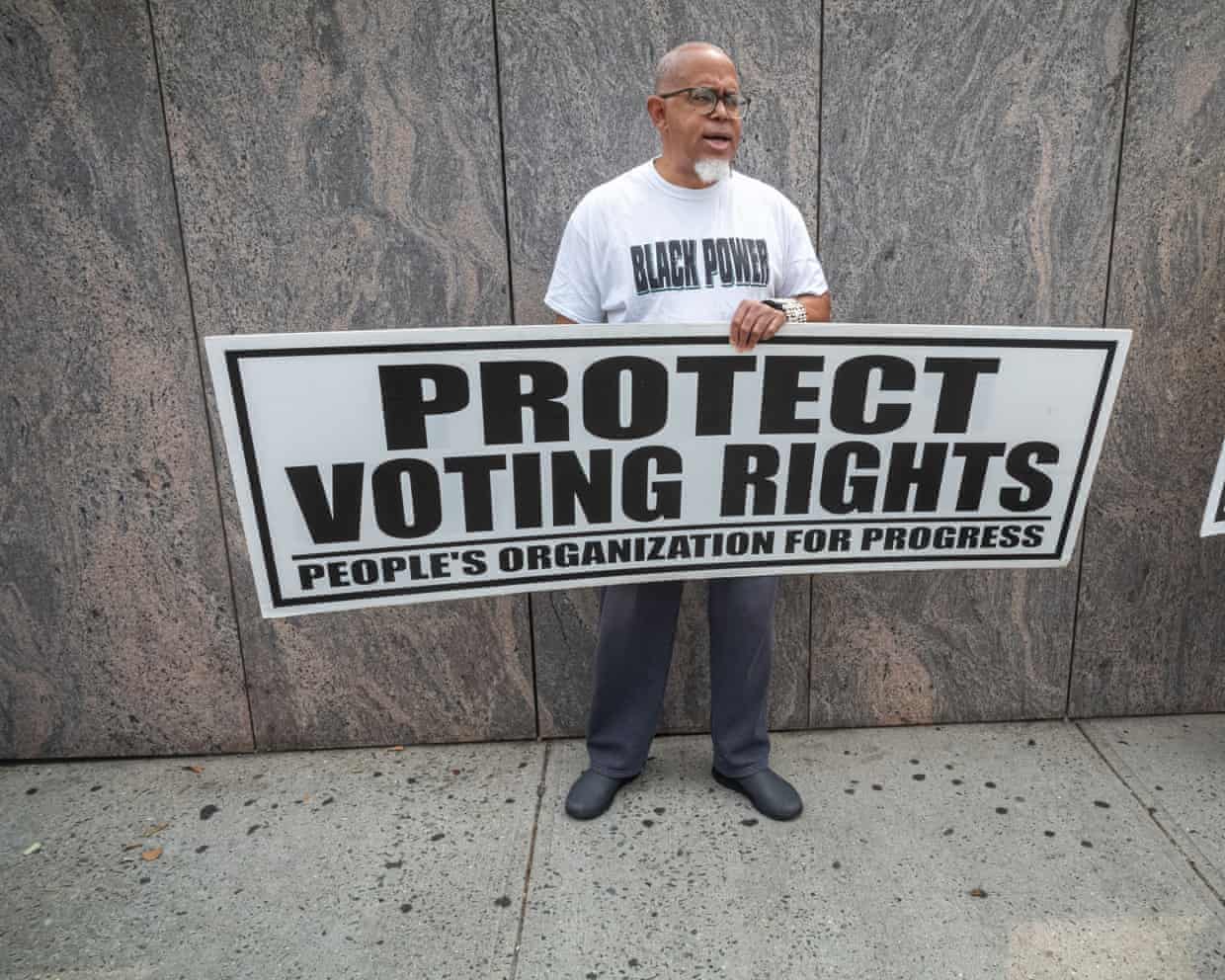
Some Democrats want to use gerrymandering. That’s a bad idea
Entities mentioned:
- Democrats: Power, Justice, Ambition
- Republicans: Power, Control, Competitive spirit
- U.S. Congress: Power, Control, Legacy
- Trump: Power, Control, Ambition
Article Assessment:
Credibility Score: 65/100
Bias Rating: 40/100 (Lean Left)
Sentiment Score: 35/100
Authoritarianism Risk: 25/100 (Generally Democratic)
Bias Analysis:
The article leans slightly left, criticizing Republican gerrymandering more heavily and expressing concerns about Trump's influence. However, it also critiques Democratic strategies, maintaining some balance.
Key metric: Electoral Representation Fairness
As a social scientist, I analyze that this article highlights the complex issues surrounding gerrymandering and its impact on fair representation in the U.S. political system. The piece argues against the use of gerrymandering by Democrats, pointing out its potential backfire through 'dummymandering'. It also critically examines the 1929 Reapportionment Act, suggesting that increasing the number of House representatives could mitigate gerrymandering effects and improve representation. The analysis extends to the Electoral College system, proposing that more House seats would make it more representative of the population. The article concludes by questioning whether Democrats should take a more aggressive stance against perceived authoritarianism, reflecting the tension between maintaining democratic norms and combating perceived threats to democracy.

Mike Lee Stresses He Would Have Posted Same Thing If Own Family Savagely Murdered
Entities mentioned:
- Mike Lee: Righteousness, Moral outrage, Pride
- Democrats: Moral outrage, Justice, Indignation
- Gov. Walz: Duty, Security, Unity
- Elon Musk: Influence, Recognition, Controversy
Article Assessment:
Credibility Score: 65/100
Bias Rating: 40/100 (Lean Left)
Sentiment Score: 25/100
Authoritarianism Risk: 55/100 (Mixed/Neutral)
Bias Analysis:
The article leans left in its framing, presenting Senator Lee's statements in a way that invites criticism. While quoting Lee directly, the satirical nature and choice of words ('tasteless', 'mocking') suggest disapproval of his stance.
Key metric: Political Polarization Index
As a social scientist, I analyze that this article highlights the extreme polarization in American politics. Senator Mike Lee's hypothetical response to a tragedy affecting his own family demonstrates a prioritization of partisan rhetoric over empathy or unity. This behavior likely contributes to increased political division, potentially damaging democratic discourse and cooperation. The senator's willingness to use personal tragedy for political gain, even hypothetically, suggests a concerning trend in political communication where shock value and partisan point-scoring supersede constructive dialogue. This approach may further erode public trust in political institutions and exacerbate existing societal tensions.

EXCLUSIVE: Trump touts 'zero tax' benefits for majority of seniors on social security’s 90th anniversary
Entities mentioned:
- Donald Trump: Legacy, Influence, Recognition
- Franklin D. Roosevelt: Legacy, Justice, Unity
- Social Security Administration: Duty, Professional pride, Security
- Democrats: Moral outrage, Justice, Security
- Republicans: Competitive spirit, Loyalty, Control
- Liz Huston: Loyalty, Duty, Influence
Article Assessment:
Credibility Score: 55/100
Bias Rating: 75/100 (Lean Right)
Sentiment Score: 70/100
Authoritarianism Risk: 35/100 (Generally Democratic)
Bias Analysis:
The article heavily relies on Trump administration sources and presents their claims without significant counterbalance. It frames criticisms as 'Democrats flail and peddle lies,' indicating a clear right-leaning perspective.
Key metric: Social Security Program Effectiveness
As a social scientist, I analyze that this article presents a complex interplay between political messaging and social policy. The Trump administration is framing its actions as strengthening Social Security, emphasizing reduced wait times, technological improvements, and tax benefits for seniors. This narrative aims to counter Democratic criticisms and position Trump as a protector of the program. The focus on the 90th anniversary serves as a rhetorical device to connect current policies with the program's historical significance. However, the article primarily presents the administration's perspective, lacking a balanced presentation of opposing viewpoints or independent analysis of the claims made. The emphasis on 'zero tax' benefits and service improvements suggests a strategy to appeal to older voters, a crucial demographic in elections. The article's reliance on administration sources and lack of external expert opinions limits its comprehensive analysis of the actual impact on Social Security's long-term sustainability.

Chuck Todd warns that Dems are falling into Trump’s trap, 'taking the bait' on redistricting
Entities mentioned:
- Chuck Todd: Professional pride, Duty, Wariness
- Democrats: Power, Justice, Revenge
- Republicans: Power, Control, Self-preservation
- Donald Trump: Power, Control, Influence
- Beto O'Rourke: Ambition, Power, Justice
Article Assessment:
Credibility Score: 70/100
Bias Rating: 55/100 (Center)
Sentiment Score: 25/100
Authoritarianism Risk: 35/100 (Generally Democratic)
Bias Analysis:
The article presents criticism of both Democrats and Republicans, showing a relatively balanced approach. However, there's slightly more focus on Democratic actions and responses, which may indicate a subtle center-right lean.
Key metric: Political Polarization Index
As a social scientist, I analyze that this article highlights the increasing political polarization in the United States, particularly in the context of redistricting efforts. Chuck Todd's warnings about Democrats 'taking the bait' and engaging in 'revenge redistricting' suggest a cycle of escalating partisan tactics. This behavior, according to Todd, plays into Trump's strategy of normalizing unethical political practices. The comparison to historical periods of extreme division (1850s America, 1930s Germany) further emphasizes the perceived gravity of the current political climate. The article suggests that both major parties are prioritizing power over principles, potentially eroding democratic norms and institutions. This escalation of partisan tactics in redistricting could lead to further entrenchment of political divisions, decreased faith in democratic processes, and a more volatile political landscape.

DAVID MARCUS: Trump understands that safety is for every citizen, not just the lucky few
Entities mentioned:
- Donald Trump: Ambition, Power, Legacy
- Democrats: Competitive spirit, Loyalty, Control
- Sen. Sheldon Whitehouse: Righteousness, Loyalty, Indignation
- Rep. Eric Swalwell: Competitive spirit, Recognition, Influence
- Rudy Giuliani: Determination, Legacy, Professional pride
- Mayor Muriel Bowser: Duty, Security, Pragmatism
Article Assessment:
Credibility Score: 45/100
Bias Rating: 75/100 (Lean Right)
Sentiment Score: 65/100
Authoritarianism Risk: 65/100 (Authoritarian Tendencies)
Bias Analysis:
The article heavily favors Trump's perspective and criticizes Democrats, using loaded language and selective examples. It presents a one-sided view of the crime situation and policy responses, aligning closely with right-wing talking points.
Key metric: Violent Crime Rate
As a social scientist, I analyze that this article focuses on President Trump's initiative to address crime in Washington D.C., framing it as a bold and necessary action. The article draws parallels to historical figures and past successful crime reduction efforts, particularly Rudy Giuliani's work in New York City. It portrays Democrats as obstructionist and out of touch with the realities of crime, while painting Trump as a decisive leader addressing a critical issue. The emphasis on public safety as a fundamental right and governmental responsibility is central to the article's argument. This initiative could potentially impact the violent crime rate in D.C. and, by extension, influence national crime statistics and policies. However, the article's strong partisan framing and lack of diverse perspectives limit its comprehensive analysis of the complex factors contributing to urban crime rates.

Republicans are quietly rolling back Obamacare. Here’s how
Entities mentioned:
- Republicans: Control, Power, Influence
- Donald Trump: Power, Legacy, Control
- John McCain: Duty, Righteousness, Self-respect
- Joe Biden: Legacy, Duty, Influence
- Democrats: Justice, Duty, Influence
- Centers for Medicare and Medicaid Services: Control, Duty, Professional pride
- Larry Levitt: Professional pride, Duty, Influence
- Jennifer Sullivan: Justice, Professional pride, Duty
- Brian Blase: Professional pride, Influence, Righteousness
Article Assessment:
Credibility Score: 75/100
Bias Rating: 45/100 (Center)
Sentiment Score: 35/100
Authoritarianism Risk: 25/100 (Generally Democratic)
Bias Analysis:
The article presents multiple viewpoints and cites various sources, including both liberal and conservative think tanks. However, it gives slightly more space to critiques of the Republican changes, suggesting a mild left-leaning bias.
Key metric: Healthcare Coverage Rate
As a social scientist, I analyze that the Republican efforts to modify the Affordable Care Act (ACA) through legislative and regulatory changes are likely to have significant impacts on healthcare coverage in the United States. The new law and CMS rule are expected to reduce enrollment in ACA plans by making it more difficult to enroll and maintain coverage, increasing costs for enrollees, and restricting eligibility for certain groups. This is projected to lead to millions more uninsured Americans over the next decade, reversing gains made since the ACA's implementation. The changes also risk destabilizing the ACA marketplaces by potentially driving out healthier enrollees, which could lead to premium increases and insurer exits. These actions, while less overt than previous repeal attempts, represent a significant shift in healthcare policy that could have long-lasting effects on access to health insurance and healthcare services for many Americans.

Vance calls out Democrats over Epstein files, reignites push for transparency
Entities mentioned:
- JD Vance: Loyalty, Righteousness, Competitive spirit
- Donald Trump: Transparency, Self-preservation, Power
- Democrats: Political opportunism, Control, Self-preservation
- Joe Biden: Self-preservation, Power, Control
- Jeffrey Epstein: Power, Control, Greed
- Justice Department: Duty, Transparency, Justice
- Pam Bondi: Duty, Justice, Professional pride
- Kash Patel: Duty, Professional pride, Loyalty
- House Oversight Committee: Justice, Transparency, Duty
Article Assessment:
Credibility Score: 65/100
Bias Rating: 65/100 (Lean Right)
Sentiment Score: 35/100
Authoritarianism Risk: 40/100 (Generally Democratic)
Bias Analysis:
The article leans right, primarily due to the prominence given to Vance's accusations against Democrats without equal space for rebuttal. While it includes some balancing information, the framing tends to favor the Trump administration's perspective.
Key metric: Government Transparency Index
As a social scientist, I analyze that this article highlights a complex political struggle over transparency and accountability in the Epstein case. The push for releasing documents is framed as a bipartisan issue, but with clear political motivations from both sides. The Trump administration, through Vance, is positioning itself as pro-transparency while accusing Democrats of inaction and possible connections to Epstein. This narrative serves to deflect criticism and potentially pre-empt damaging revelations. The Justice Department's moves towards releasing some information, along with the House Oversight Committee's subpoenas, indicate increasing pressure for disclosure. However, the conflicting accounts of White House meetings and the careful management of information release suggest ongoing tensions between transparency and potential political fallout. This situation may lead to incremental increases in government transparency, but also risks further polarization and erosion of public trust in institutions depending on how the information is ultimately handled and presented.

Republicans are going outside of Texas to try to redraw more US House seats
Entities mentioned:
- National Republicans: Power, Control, Competitive spirit
- Donald Trump: Power, Influence, Revenge
- JD Vance: Influence, Loyalty, Ambition
- GOP state lawmakers: Self-preservation, Wariness, Loyalty
- Democrats: Self-preservation, Justice, Competitive spirit
- Mike Braun: Wariness, Self-preservation, Loyalty
- Ralph Norman: Ambition, Competitive spirit, Power
- Nancy Mace: Self-preservation, Wariness, Professional pride
- Jim Clyburn: Self-preservation, Justice, Loyalty
- Mike Kehoe: Loyalty, Power, Competitive spirit
- Emanuel Cleaver: Self-preservation, Justice, Determination
- Daniel Perez: Power, Influence, Loyalty
- Ron DeSantis: Power, Ambition, Control
Article Assessment:
Credibility Score: 75/100
Bias Rating: 45/100 (Center)
Sentiment Score: 45/100
Authoritarianism Risk: 65/100 (Authoritarian Tendencies)
Bias Analysis:
The article presents a relatively balanced view, including perspectives from both Republicans and Democrats. While it focuses more on Republican strategies, it also mentions potential drawbacks and opposition, indicating an attempt at neutrality.
Key metric: Congressional Seat Distribution
As a social scientist, I analyze that this article highlights a concerted effort by Republican leadership to redraw congressional districts in multiple states to gain more GOP-friendly seats ahead of the 2026 midterm elections. This strategy, seemingly driven by Trump and his allies, aims to consolidate Republican power in the House of Representatives. The approach faces several challenges, including potential legal issues, resistance from some GOP state lawmakers, and the risk of spreading Republican votes too thin. The article showcases the tension between national party goals and local political realities, as well as the ongoing debate over the fairness and legality of redistricting practices. This redistricting push could significantly impact the balance of power in Congress and potentially alter the representation of minority communities, raising important questions about democratic representation and the long-term implications of partisan gerrymandering.

4 possible outcomes of a gerrymandering battle royale
Entities mentioned:
- Texas Republicans: Power, Control, Competitive spirit
- Democrats: Justice, Competitive spirit, Power
- Donald Trump: Power, Control, Ambition
- Supreme Court: Justice, Duty, Influence
- Texas Democrats: Justice, Determination, Righteousness
- John Cornyn: Power, Loyalty, Competitive spirit
- Kevin Kiley: Justice, Duty, Self-preservation
- Mike Lawler: Justice, Duty, Self-preservation
Article Assessment:
Credibility Score: 75/100
Bias Rating: 45/100 (Center)
Sentiment Score: 30/100
Authoritarianism Risk: 65/100 (Authoritarian Tendencies)
Bias Analysis:
The article presents multiple perspectives and potential outcomes, indicating an attempt at balanced reporting. However, there's a slight lean towards criticizing Republican actions, which is balanced by acknowledging potential Democratic responses.
Key metric: Democratic Index
As a social scientist, I analyze that this article highlights a significant threat to the democratic process in the United States through the escalation of partisan gerrymandering. The potential for a 'gerrymandering arms race' could lead to instability in representative democracy, as districts may be redrawn more frequently for political gain rather than to reflect population changes. This practice undermines the principle of fair representation and could further polarize the political landscape. The article suggests that this trend could result in a continuous cycle of retaliatory redistricting, potentially eroding public trust in the electoral system and weakening the connection between representatives and their constituents. The proposed solutions, such as legislative action or political standoffs, seem unlikely to succeed in the current partisan climate, indicating a potential long-term negative impact on the Democratic Index of the United States.

Republicans reprise anti-transgender ‘Kamala is for they/them’ ads for the midterms
Entities mentioned:
- Republicans: Power, Control, Fear
- Roy Cooper: Ambition, Righteousness, Justice
- Senate Leadership Fund: Power, Influence, Control
- Kamala Harris: Justice, Righteousness, Duty
- Donald Trump: Power, Control, Influence
- Jon Ossoff: Justice, Duty, Righteousness
- Chris LaCivita: Competitive spirit, Power, Influence
- Democrats: Justice, Righteousness, Unity
- Viet Shelton: Duty, Righteousness, Justice
- Buddy Carter: Power, Competitive spirit, Loyalty
- Winsome Earle-Sears: Power, Control, Competitive spirit
- Abigail Spanberger: Justice, Duty, Righteousness
- Gavin Newsom: Ambition, Power, Influence
- Pete Buttigieg: Ambition, Influence, Righteousness
- Human Rights Campaign: Justice, Righteousness, Unity
- Tim Walz: Righteousness, Justice, Unity
- Stephen Cloobeck: Ambition, Competitive spirit, Power
Article Assessment:
Credibility Score: 75/100
Bias Rating: 55/100 (Center)
Sentiment Score: 35/100
Authoritarianism Risk: 45/100 (Mixed/Neutral)
Bias Analysis:
The article presents views from both Republican and Democratic sides, quoting various sources. However, it gives slightly more space to critiquing Republican strategies, suggesting a slight center-left lean.
Key metric: Political Polarization Index
As a social scientist, I analyze that this article highlights the increasing political polarization in the United States, particularly around transgender issues. The Republicans' strategy of using anti-transgender messaging in political ads demonstrates an attempt to create wedge issues and mobilize their base. This approach may deepen existing societal divisions and further alienate the LGBTQ+ community. The Democrats' response, while attempting to focus on economic issues, shows some internal disagreement on how to address these attacks. This polarization could lead to increased social tension, policy gridlock, and a decline in civil discourse, potentially impacting the overall functioning of democratic institutions.